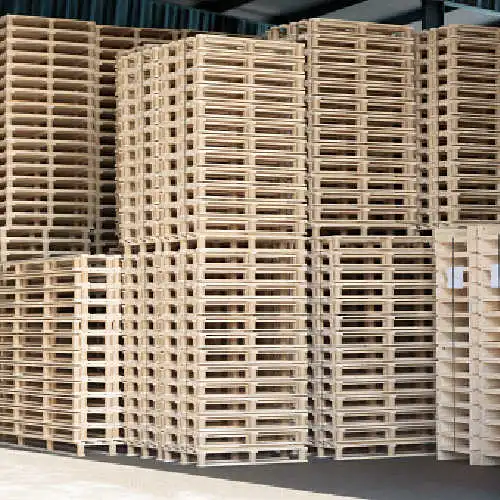11 key benefits of pallet pooling
Pallet pooling has emerged as a strategic and efficient approach to logistics and supply chain management, revolutionizing the way businesses handle and transport goods. Under the heading “Optimizing Logistics: Unveiling the 11 Key Benefits of Pallet Pooling,” this exploration delves into the myriad advantages that businesses can accrue by embracing the innovative concept of pallet pooling.
Also Read: Navigating the Trade-offs: Exploring the Pros and Cons of Wood Pallets
1. Cost Efficiency: Pallet pooling presents a cost-effective solution for businesses looking to optimize their supply chain expenses. By sharing pallets within a pool, companies can collectively benefit from reduced procurement costs, eliminating the need for individual investments in pallet assets. This collaborative approach leads to significant cost savings across the entire supply chain.
2. Enhanced Resource Utilization: Pooling pallets enables enhanced resource utilization as pallets are continuously in circulation. Rather than remaining idle at various points in the supply chain, pooled pallets are actively used and contribute to the efficient movement of goods. This dynamic utilization ensures that resources are maximized, promoting a more sustainable and eco-friendly logistics model.
3. Streamlined Supply Chain Processes: Pallet pooling streamlines supply chain processes by providing a standardized and consistent pallet pool. This uniformity facilitates smoother material handling, warehousing, and transportation operations. Standardized pallets reduce the complexities associated with handling various pallet types, contributing to overall operational efficiency.
4. Reduced Pallet Waste: In a pallet pooling system, the lifecycle of each pallet is carefully managed. Damaged or unserviceable pallets are promptly repaired or replaced, minimizing pallet waste. This proactive approach aligns with sustainability goals by reducing the environmental impact associated with pallet disposal and promoting a circular economy in pallet management.
5. Scalability and Flexibility: Pallet pooling offers scalability and flexibility to businesses of all sizes. As demand fluctuates, companies can easily adjust the number of pallets they require within the pool. This adaptability ensures that businesses can scale their operations efficiently without the burden of managing excess pallet inventory during periods of lower demand.
6. Improved Traceability: With pallet pooling, traceability is significantly enhanced. Each pallet within the pool is typically tracked and monitored, providing real-time visibility into its location and condition. This traceability is invaluable for inventory management, ensuring that businesses have accurate and up-to-date information about the movement of their goods.
7. Lower Administrative Burden: Managing a fleet of pallets individually can be administratively burdensome. Pallet pooling alleviates this burden by centralizing pallet management functions. From tracking and maintenance to invoicing and reconciliation, the administrative tasks associated with pallets are streamlined, allowing businesses to focus on core operations.
8. Enhanced Collaboration Across the Supply Chain: Pallet pooling fosters collaboration across the entire supply chain. By participating in a shared pallet pool, businesses, suppliers, and distributors collaborate more closely. This collaborative approach builds stronger relationships, enhances communication, and creates a more cohesive and efficient supply chain ecosystem.
9. Access to High-Quality Pallets: In a pallet pooling system, participants have access to consistently high-quality pallets. The pooled pallets are regularly inspected, maintained, and repaired as needed. This ensures that businesses can rely on durable and well-maintained pallets for their goods, reducing the risk of damage during transit.
10. Rapid Response to Market Changes: The flexibility inherent in pallet pooling allows businesses to respond rapidly to market changes. Whether scaling up or down, adjusting to seasonal demand, or entering new markets, companies can adapt their pallet requirements accordingly within the pooling system. This agility is a key advantage in today’s dynamic business environment.
11. Sustainable Supply Chain Practices: Pallet pooling aligns with sustainable supply chain practices. By extending the lifespan of pallets through regular maintenance and repair, businesses contribute to resource conservation. The collaborative nature of pooling reduces the overall environmental footprint associated with pallet production, disposal, and the need for continuous new pallet manufacturing.
In conclusion, the 11 key benefits of pallet pooling underscore its transformative impact on logistics and supply chain management. From cost efficiency and improved resource utilization to streamlined processes, reduced waste, and sustainable practices, pallet pooling represents a forward-thinking approach that empowers businesses to enhance their operational efficiency while contributing to environmental sustainability.






